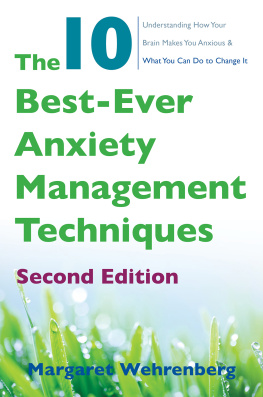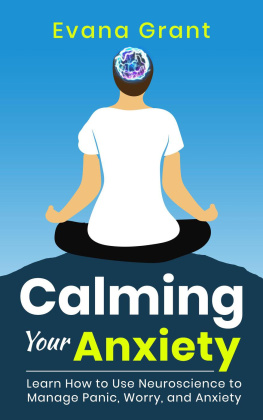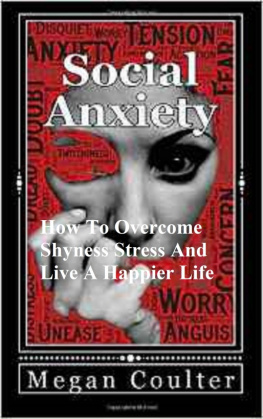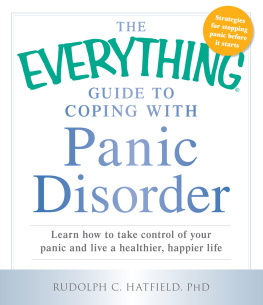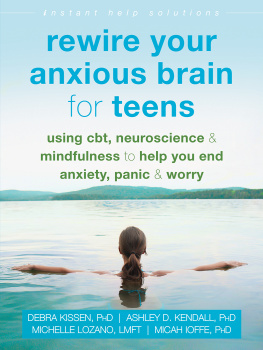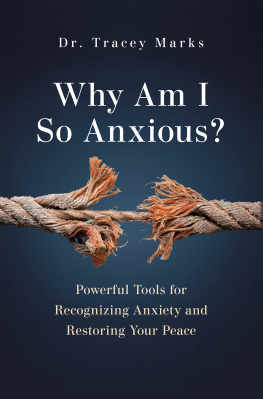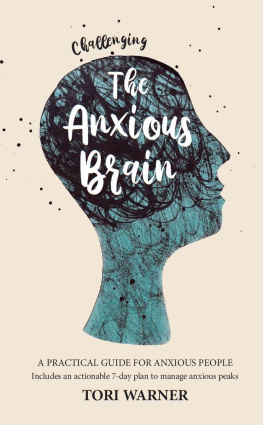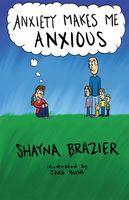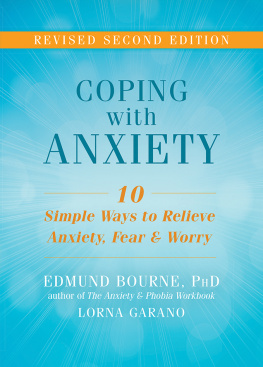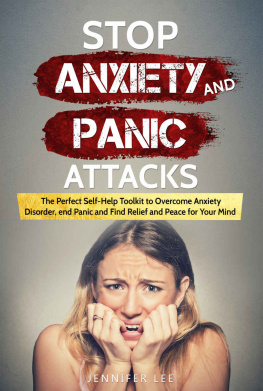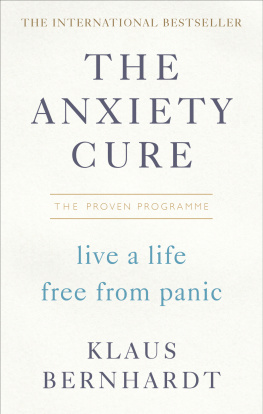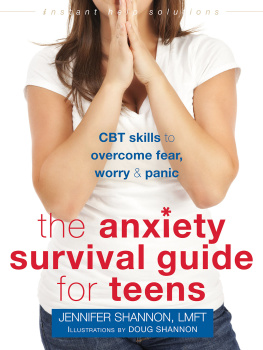Practical and Effective
Tools toConquer Anxiety
RETRAIN YOUR
ANXIOUS BRAIN
JOHN TSILIMPARIS, MFT
WITH DAYLLE DEANNA SCHWARTZ
CONTENTS
UnderstandingAnxiety
IdentifyingYour Personal Belief System
Challengingthe Notion of Consensus Reality
Balancing theDualistic Mind
Rising Abovethe Illusion of Control
TheAccountable Self: Taking Responsibility for You
Creating YourOwn Reality: Practicing the Inner Management of Yourself
SolidifyingYour Sense of Self to Build a Healthy Self-Esteem
ExtremeAcceptance: The X Games for the Mind
ReducingAnxiety in Intimate Relationships
Anxiety-Reduction Maintenance: How to Keep It Going
Making Peacewith Your Anxiety: Surrendering the Fight, Not the Cause
INTRODUCTION
Everyone experiences symptoms of anxiety throughouttheir lives at different times and in varying degrees. Some people shrug off ordismiss everyday stress and anxiety as part of lifes unavoidable ups and downsand dont think much of it beyond that. But for others, ongoing stress leads todeveloping symptoms of chronic anxiety that can significantly impair peoplesdaily functioning and cause a major disruption in their lives. Anxiety oftensneaks up on people and feels unavoidable. Fortunately, anxiety can be treated,but the consequences for allowing it to go unchecked can have negativeresults.
Its estimated that about 40 million adults in the UnitedStates suffer from some form of anxiety. Yet despite how prevalent it is, alarge percentage of anxiety sufferers dont seek help because they feel toouncomfortable or embarrassed to talk about it, or theyre scared that admittingto having it will stigmatize them. To many people, especially those who haventexperienced it over a long period of time, anxiety seems like a self-inflictedailment that people need to get over. Because it has often been negativelyviewed as a sign of weakness, having anxiety also causes many individuals agreat deal of personal shame, which can lead them to isolate themselves andsuffer alone. It can be a painful way to live. I know, because it happened tome.
MY EXPERIENCE WITH ANXIETY
I didnt write this book about handling anxiety justfrom the point of view of a therapist who learned about it in school, although Iam one. This is my story, too. I knowabout anxiety on a personal level because I have a long history with it datingback to childhood. I wrote this book because after many years of suffering, Ilearned practical, effective ways to handle my anxiety that allowed me tofinally enjoy my life, and I want to pass them on to help you learn how toretrain your anxious mind. I write from both the perspective of a therapist andas someone who lived through many years of debilitating anxiety, and it was byusing the tools in this book that I was finally able to manage it.
I know what its like to wonder if youre going crazy becauseof the anxious feelings that come over you for no discernible reason and that noone understands. I can relate to the powerless feeling you can have when youcant control your escalating panic and dont know how to find relief. But Ialso know the relief of finally learning how to help myself. You can do it, too!Ill help you, just as I did when I treated people with anxiety on the TV show, Obsessed. I heard from people aroundthe world who saw me on the show, asking if I could share more of my techniques.They also suffered from anxiety and were desperate for help to control it. Irelate to their pain, and if what I share makes a positive difference for you,it matters to me.
My anxiety began when I was young. By the time I was eightyears old, I was aware that I was a different kind of child. I just wanted tofit in like everyone else, but I knew that I didnt. No matter how hard I tried,I felt alienated by my puzzling condition that no one could understand, not evenme. I reacted to situations in ways that seemed wrong or unacceptable and didntknow why. I was criticized or ignored when I reached out for support. For yearsI wondered what would become of me and how Id ever be able to survive in theworld with such an incapacitating handicap. The uncertainty carved deep groovesof permanent insecurity. The future looked grim and scary.
It all started one night when I suffered my first anxietyattack after my parents put me to bed. Out of nowhere, a terrifying current offear surged through my body like a demonic possession. My heart began beatingrapidly, I gasped for air and I began to sweat. My mind raced uncontrollably,and I thought I was going to die. I ran into my parents bedroom and, in afrantic state, I woke up my mother, not knowing what was happening to me. Shelifted her head from the pillow and in a drowsy tone whispered very softly thatI should be careful not to wake up my father. It wasnt until I was in mymid-twenties that I realized how significant her words would become.
She murmured, Go back to bed. You have nothing to be afraidof. I went back to my bed as she instructed and hoped she was right. For amoment I believed her without question, but the panic continued. As I lay awakefor the rest of the night, trembling, I wondered if I was going to see thedaylight again. I felt alone and terrified, knowing I had no one to turn to. Asa child, its especially hard to understand whats going on when anxiety hits,which makes you feel powerless. I wasnt in control of myselfthe anxiety was.It was the first of many dark and lonely nights to come.
For the next four years, the panic attacks and general anxietythat developed from them occurred intermittently and without warning. Igradually understood that something was amissbecause if there was nothing to beafraid of, as my mother declared, yet I was still afraid, then the only answercould be that something was truly wrong with me. I also remember thinking that Imust be stupid and weak if I was scared of nothing. There was no identifiablesource of stress that I could verbalize to my motherno monsters under the bedor a boogeyman in the closet. There was simply no reason to feel so frightened.I had never even heard of the word anxiety . No one ever spoke about it to me. I dont think anyone inmy family even thought about it. My problem was just shrugged off, and I wasleft to deal with it on my own.
By the age of twelve, my panic attacks mysteriously wentdormant, and for the next nine years, they stayed hidden in the deep recesses ofmy mind. But when I returned home to New York City after college, the anxietyreturned with great intensity. By then I was an adult and had a more matureability to understand that I needed help. I also seriously recognized my need toseek help instead of letting my problem be minimized or ignored by my parents.Desperation finally convinced me to give in and go to a psychotherapist. Atfirst my parents tried to deter me from seeking any kind of psychiatric care.They believed that therapy was only intended for crazy people and shamelesslyadmitted they were worried that the therapist would somehow brainwash me andturn me against them.
Usually, their opinionsespecially my fatherswere extremelyinfluential and difficult to ignore without fear of reprisal. Luckily, I didntlisten to them this time and moved forward with treatment despite theirobjections. I was desperate and knew I needed someone else to guide me out of myconfusion. It was one of the most crucial decisions I ever made in my life.
Many people who suffer from anxiety are often discouraged fromgetting help by well-meaning but uninformed people. The belief that anxiety canbe controlled if you simply try hard enough often prevents people from takingyou seriously and can make you feel low about your inability to get over it.It also can deter you from taking therapeutic steps to actually get the kind ofhelp you need.
After two years of on-and-off treatment sessions with a verybright and compassionate therapist, I learned to use solid coping tools to helpmanage my anxiety better. However, I also realized that despite the therapy Istill felt very different from other people. I noticed I was still more reactiveto potentially stressful situations and worried a lot about things that mostpeople easily accepted.
Next page

